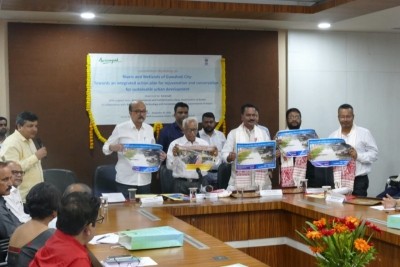
Guwahati, Experts and policymakers on Tuesday stressed on restoring the water bodies in Guwahati through a multi-stakeholder approach.
Addressing a workshop on 'Rivers and wetlands of Guwahati City: Towards an integrated action plan for rejuvenation, conservation, and sustainable urban development', Assam's Minister of Housing & Urban Affairs and Irrigation, Ashok Singhal, solicited cooperation from all the stakeholders for rejuvenating and conserving the dying as well as polluted water bodies in Guwahati.
Singhal pointed out that the city's haphazard development over the years is the root cause of the problem because practically no stream has been left unpolluted and no wetland has been left un-encroached upon.
He said that the state government is working towards rejuvenating all these wetlands and hoped for the support of all the stakeholders.
The minister assured that 50-60 per cent of the municipal waste would be processed through a project in the coming year.
"According to the Prime Minister's directive, water bodies throughout the country must be protected. Hopefully, this workshop will result in sustainable conservation of water bodies in and around the city and help restore them," Singhal said.
Guwahati serves as a gateway not only to the northeast region, but also to Southeast Asia, as reflected in the Government of India's Act East policy.
With a total area of more than 328 sq km and a population of over 10 lakh, it is one of the fastest growing cities in the country.
The Vice-Chairman of State Innovation and Transformation Ayog (SITA), Ramen Deka, told the gathering that human activities have destroyed nature and wildlife habitats, and it's our responsibility now to restore and conserve them.
Due to pollution and encroachment in the city, the Bharalu river has been reduced to a mere polluted drain, and the problem of flash floods in the city has aggravated due to garbage-filled water bodies in many more wetlands, Deka said.
Northeast India's leading biodiversity conservation organisation 'Aaranyak' organised the workshop in collaboration with SITA and Assam Science Technology and Environment Council (ASTEC).
Environmentalist and head of Aaranyak's water, climate and hazard division (WATCH), Partha Jyoti Das said: "Bharalu, Mora Bharalu, Basistha, Bahini, Pamohi, Khanajan, Kalmoni and Bondajan are some of the prominent rivers and streams that drain the cityscape. Deeparbeel, Borsola, Sarusola and Silsako are the main wetlands that act as storm water reservoirs of the city."
Das said it is noteworthy that several of these water bodies are hydrologically connected to each other, meaning they contribute water to one another. In the case of some wetlands, the inter-connecting channels have disappeared due to unpragmatic constructions and land development.


.jpeg)

